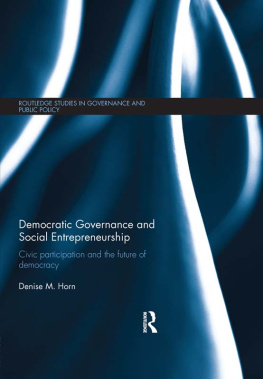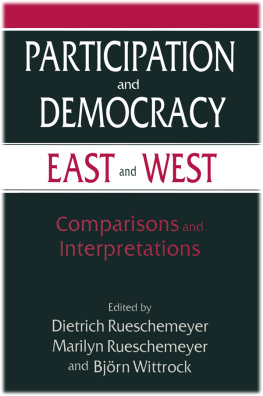Euripidis Loukis - E-Participation in Southern Europe and the Balkans: Issues of Democracy and Participation via Electronic Media
Here you can read online Euripidis Loukis - E-Participation in Southern Europe and the Balkans: Issues of Democracy and Participation via Electronic Media full text of the book (entire story) in english for free. Download pdf and epub, get meaning, cover and reviews about this ebook. year: 2012, publisher: Routledge, genre: Politics. Description of the work, (preface) as well as reviews are available. Best literature library LitArk.com created for fans of good reading and offers a wide selection of genres:
Romance novel
Science fiction
Adventure
Detective
Science
History
Home and family
Prose
Art
Politics
Computer
Non-fiction
Religion
Business
Children
Humor
Choose a favorite category and find really read worthwhile books. Enjoy immersion in the world of imagination, feel the emotions of the characters or learn something new for yourself, make an fascinating discovery.
- Book:E-Participation in Southern Europe and the Balkans: Issues of Democracy and Participation via Electronic Media
- Author:
- Publisher:Routledge
- Genre:
- Year:2012
- Rating:3 / 5
- Favourites:Add to favourites
- Your mark:
- 60
- 1
- 2
- 3
- 4
- 5
E-Participation in Southern Europe and the Balkans: Issues of Democracy and Participation via Electronic Media: summary, description and annotation
We offer to read an annotation, description, summary or preface (depends on what the author of the book "E-Participation in Southern Europe and the Balkans: Issues of Democracy and Participation via Electronic Media" wrote himself). If you haven't found the necessary information about the book — write in the comments, we will try to find it.
Euripidis Loukis: author's other books
Who wrote E-Participation in Southern Europe and the Balkans: Issues of Democracy and Participation via Electronic Media? Find out the surname, the name of the author of the book and a list of all author's works by series.
E-Participation in Southern Europe and the Balkans: Issues of Democracy and Participation via Electronic Media — read online for free the complete book (whole text) full work
Below is the text of the book, divided by pages. System saving the place of the last page read, allows you to conveniently read the book "E-Participation in Southern Europe and the Balkans: Issues of Democracy and Participation via Electronic Media" online for free, without having to search again every time where you left off. Put a bookmark, and you can go to the page where you finished reading at any time.
Font size:
Interval:
Bookmark:
Euripidis Loukis, Ann Macintosh and Yannis Charalabidis

2 Park Square, Milton Park, Abingdon,Oxon, OX14 4RN
by Routledge
711 Third Avenue, New York, NY 10017
A catalogue record for this book is available from the British Library
by Taylor & Francis Books
| Euripidis Loukis, Ann Macintosh and Yannis Charalabidis |
| Euripidis Loukis |
| Sotirios Koussouris, Yannis Charalabidis, Loukas Kipenis, Dimitrios Askounis and Odetta Stavri |
| Andrea Resca |
| Eleni Panopoulou, Efthimios Tambouris, Elena Sanchez-Nielsen, Maria Zotou and Konstantinos Tarabanis |
| Beniamino Murgante, Lucia Tilio, Viviana Lanza and Francesco Scorza |
| Clelia Colombo, Mateja Kunstelj, Francesco Molinari and Ljupco Todorovski |
Font size:
Interval:
Bookmark:
Similar books «E-Participation in Southern Europe and the Balkans: Issues of Democracy and Participation via Electronic Media»
Look at similar books to E-Participation in Southern Europe and the Balkans: Issues of Democracy and Participation via Electronic Media. We have selected literature similar in name and meaning in the hope of providing readers with more options to find new, interesting, not yet read works.
Discussion, reviews of the book E-Participation in Southern Europe and the Balkans: Issues of Democracy and Participation via Electronic Media and just readers' own opinions. Leave your comments, write what you think about the work, its meaning or the main characters. Specify what exactly you liked and what you didn't like, and why you think so.










